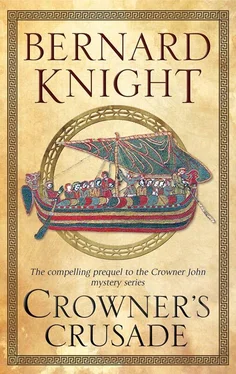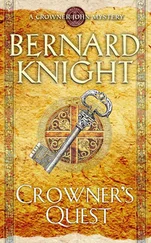Bernard Knight - Crowner's Crusade
Здесь есть возможность читать онлайн «Bernard Knight - Crowner's Crusade» весь текст электронной книги совершенно бесплатно (целиком полную версию без сокращений). В некоторых случаях можно слушать аудио, скачать через торрент в формате fb2 и присутствует краткое содержание. Жанр: Исторический детектив, на английском языке. Описание произведения, (предисловие) а так же отзывы посетителей доступны на портале библиотеки ЛибКат.
- Название:Crowner's Crusade
- Автор:
- Жанр:
- Год:неизвестен
- ISBN:нет данных
- Рейтинг книги:5 / 5. Голосов: 1
-
Избранное:Добавить в избранное
- Отзывы:
-
Ваша оценка:
- 100
- 1
- 2
- 3
- 4
- 5
Crowner's Crusade: краткое содержание, описание и аннотация
Предлагаем к чтению аннотацию, описание, краткое содержание или предисловие (зависит от того, что написал сам автор книги «Crowner's Crusade»). Если вы не нашли необходимую информацию о книге — напишите в комментариях, мы постараемся отыскать её.
Crowner's Crusade — читать онлайн бесплатно полную книгу (весь текст) целиком
Ниже представлен текст книги, разбитый по страницам. Система сохранения места последней прочитанной страницы, позволяет с удобством читать онлайн бесплатно книгу «Crowner's Crusade», без необходимости каждый раз заново искать на чём Вы остановились. Поставьте закладку, и сможете в любой момент перейти на страницу, на которой закончили чтение.
Интервал:
Закладка:
‘Perhaps it’s no bad thing that they saw us,’ he boomed, as he leaned on the rail of the aftercastle, staring after the other vessel. ‘When their tongues wag at the next port, it may mislead our enemies into thinking that we are making for the top of the Adriatic.’
In a few weeks’ time, the Lionheart may have cause to ponder on this prophetic remark, but at the moment, everyone was praying for a change in the wind and currents that would take them south and west. Thankfully, by next day their prayers were answered by a north-easterly wind the locals called the gregale and now sailing more rapidly, they rounded the heel of Italy and aimed down towards the toe. It grew warmer and calmer as they approached Sicily and the Lionheart held a council meeting on the poop, following Sunday Mass. All of them now had beards, the king’s being a reddish-blond, merging with the curly hair which had now covered his usual cropped neck. John de Wolfe’s normal black stubble had turned into a villainous-looking bush, but he said that he was damned if he was going to attack it with his specially honed knife until he could get some hot water and tallow soap to soften it.
‘We must soon make a firm decision on our route,’ the Lionheart declared, leaning against the taffrail with his advisers in a half-circle before him.
The first advice came from Brother Lawrence, the Sicilian envoy. ‘We should not try to pass through the Straits of Messina, as those on the Italian side are not well-disposed to us — and also, fighting ships from Genoa and Pisa, now in thrall to the Emperor Henry, often lurk far to the south of Sardinia.’
‘So you suggest keeping to the south side of Sicily?’ asked Robert de Turnham, who as the king’s admiral, felt responsible for the ship’s progress.
Lawrence nodded vigorously. ‘Most definitely! Also, King Tancred said that he would send messengers to the major ports along that coast, to give you the latest intelligence about those who are arrayed against you.’
They had left Corfu on the eleventh of November and due to the favourable wind, they saw the tip of Mount Etna lift above the horizon on the twentieth of the month. Gwyn and de Wolfe stood watching for the next few hours as the coast came nearer and saw a wisp of smoke around the summit, something which highly intrigued the Cornishman.
Baldwin came across to them and for a time they watched the distant plume of smoke, then talk turned to more personal matters. ‘John, you come from Devonshire, which I have heard some say is the end of the known world!’ Baldwin was being cheerfully provocative and neither of the two West Countrymen took offence.
‘That’s not Devonshire, but Cornwall, which sticks out like a sore thumb into the western ocean,’ retorted de Wolfe, with one of his rare grins. ‘That is truly the end of the world, peopled by giants with red hair!’
Gwyn beamed amiably at the taunt. ‘Giants who had long been Christian when the Normans were still pagans clad in animal skins!’
Baldwin roared with laughter and clapped the big man on the shoulder, before turning again to his master. ‘How came you to be in this Devonshire, John? Were you born there?’
‘I was indeed, and my father and grandfather before me. My great-grandfather came from Normandy with Duke William at the time of the Conquest and was granted a parcel of land which the family has worked into a manor over the generations. My father was Simon de Wolfe, son of Odo, but he was killed twelve years ago in a skirmish in Ireland.’
The noble from Artois nodded. ‘But where does your “Wolfe” come from? I bear Bethune as a name, for that is my town. I know of nowhere called “Wolfe”.’
John shook his dark head. ‘That was the battle name of my great-grandfather, given to him by his fellows because of his rabid madness when he had an axe in his hand. He was originally a landless knight, born near Caen, so the family became named after the wolf’s head device on his shield.’
A wide smile split Gwyn’s face. ‘The same rabid blood still runs in Sir John’s veins, only now he prefers a sword to a battleaxe!’
‘Have you been in England, Baldwin?’ asked John.
‘Only to Westminster and Winchester, on royal business,’ admitted the bland-featured knight. ‘That must be far from your home, I suspect.’
De Wolfe explained that his home was more than a week’s ride from London, at Stoke-in-Teignhead, near the coast beyond Exeter.
‘And you have family there?’ persisted Baldwin, who seemed curious about these natives from the remote west of the Isle of Britain.
‘My mother Enyd is still hale and hearty, and I have a younger sister and an elder brother who manages the manors, for we also have a smaller estate some miles distant.’ He felt it unnecessary to add that his generous brother William, as well as supporting their mother and sister, gave John a quarter of the manorial profits.
They watched Etna’s cone slowly diminish in the distance as they continued to sail down the east coast of Sicily. When they rounded Cape Passero, the wind sharpened and the Franche Nef began to pitch again. Everyone on board was thankful when they entered the harbour of Licata next morning. This was a small port on the island’s south coast, where Brother Lawrence said a courier from Messina would be waiting. There was deep enough water in that almost tideless sea for the shipmaster to bring the buss against the quay that projected from the town.
For once, King Richard stifled his desire for speed and agreed that all his entourage could disembark for the first time since leaving Acre, as Sicily was a Norman country, the only safe haven for them in the whole Mediterranean. With unsteady legs, the Templars and the other companions of the king went thankfully down the gangplank and entered the little town. Here they could at least eat and drink in the taverns, while the Lionheart went with Baldwin, de L’Etang and Brother Lawrence to the portreeve’s house where Tancred’s messenger would be waiting.
Here arrangements were made to transfer the horses ashore and to leave them to be sold after they had left. The portreeve was willing to pay the king for them from the town’s treasury, but at a price little more than half their original worth, because of their poor condition. The king’s clerk, Philip, was eager to bolster the contents of the strongbox in Richard’s cabin, for no one knew what the remainder of the long journey home would cost.
John and Gwyn gladly took the chance of a few hours on dry land, the first since they had enjoyed since their brief excursion on Corfu. They stocked up on some palatable food for themselves as a relief from the ship’s provender. Fruit, cheese, figs and honey was bought from stalls in the single street, then they joined several of the Templar knights who were eating and drinking in a nearby tavern. Gwyn bemoaned the absence of ale, but at least found that the wine was a better quality than in Palestine. They watched as the horses, thin and bedraggled, were hauled out in slings from the ship and herded off on tottering legs to pasture outside the town.
Sitting outside the tavern on a plank laid across two logs, the warm Sicilian sunshine and the wine was conducive to nostalgic reflection.
‘I wonder what my good wife is doing now?’ mused Gwyn. ‘Feeding the fowls or clipping my naughty lads around the ear?’
John de Wolfe had no such fond thoughts about his own spouse. Matilda was probably on her knees in some church or other, praying to God to send a thunderbolt down on her wayward husband. His wandering thoughts shifted from a certain passionate widow in Sidmouth to a willowy blonde in Dawlish. Gwyn broke in again on John’s mildly erotic reverie.
‘I’ll wager Gabriel is either playing dice in the castle gatehouse or down in the Bush Inn drinking good Devon ale brewed by your friend Nesta.’
Читать дальшеИнтервал:
Закладка:
Похожие книги на «Crowner's Crusade»
Представляем Вашему вниманию похожие книги на «Crowner's Crusade» списком для выбора. Мы отобрали схожую по названию и смыслу литературу в надежде предоставить читателям больше вариантов отыскать новые, интересные, ещё непрочитанные произведения.
Обсуждение, отзывы о книге «Crowner's Crusade» и просто собственные мнения читателей. Оставьте ваши комментарии, напишите, что Вы думаете о произведении, его смысле или главных героях. Укажите что конкретно понравилось, а что нет, и почему Вы так считаете.












